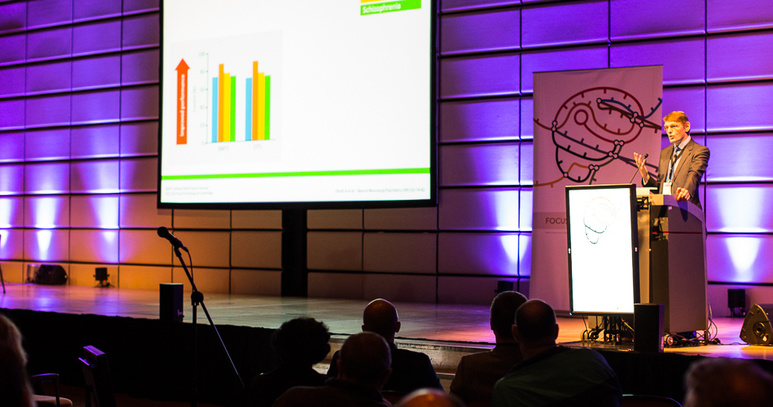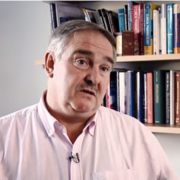
Choose a channel
Check out the different Progress in Mind content channels.

Progress in Mind

Chairman Guy Goodwin introduced not only the speakers but also the audience to Pigeonhole live – the audience being enthusiastically encouraged to make use of their smart phones throughout this interactive meeting both to ask and answer questions via this medium. Traditional question cards were provided for the technologically-challenged!
Cognition needs to be treated differently from the other symptoms associated with MDD, Professor Raymond Lam, University of British Columbia, Canada, told the audience. Cognitive dysfunction in patients with MDD often persists into remission, and it is recognised that cognitive impairment drives functional impairment and, in particular, poor work functioning. This in turn means that patients who return to work are often working sub-optimally and this has associated costs – both financial costs for society but also costs in terms of the patient’s wellbeing. Work is important to patients, not just because of the money they earn – but as a source of accomplishment, intellectual stimulation, regular activity and social interaction.
As cognitive deficits affect a patient’s ability to functionally recover, new treatment options are needed to target cognitive dysfunction and better improve functional outcomes in patients with depression.
Which test is best in the assessment of cognitive dysfunction in MDD? This was the question posed by Dr John Harrison, VU University Medical Center, Amsterdam, The Netherlands and Metis Cognition Ltd.
An ideal test should be reliable, sensitive, valid, suitable for use in the long term, available in parallel forms and suitable for cross-cultural use. Dr Harrison cautioned the audience to do three things: choose the test to answer the question you want answered, remember that exploration informs confirmation and, most importantly, never be a slave to dogma. As he explained, tests to assess cognitive functioning in Alzheimer’s disease are insufficient and prone to a number of problems, yet they failed for 20 years because researchers were slaves to dogma!
In an assessment of the FOCUS study, cognition was successfully evaluated using the Digit Symbol Substitution Test (DSST) – suggesting that this would be a good candidate test for the assessment of cognitive dysfunction in MDD.
Interestingly, a Pigeonhole survey conducted during the meeting suggested that 70% of attendees already investigated cognitive deficits in their patients with MDD on a regular basis. However, 30% of attendees did not assess cognition regularly in their patients with MDD. Maybe those that don’t currently assess cognition in depression will find the THINC® Cognition Tool of interest.
Despite the increasing recognition of the importance of the assessment of cognition in MDD, as Professor Roger McIntyre, University of Toronto, Canada reported, no accepted and validated screening tool for the objective and subjective assessment of cognitive dysfunction in MDD suitable for use in daily clinical practice is currently available. Indeed, as he stated, what is needed is a tool to measure the extent of a deficit, not just aid in its identification.
This is the underlying rationale for the development of the THINC® Cognition Tool - a tool specifically developed to detect and measure cognitive dysfunction in MDD. The THINC® Cognition Tool incorporates several brief, easy to administer objective tests including the DSST, Choice Reaction Time (CRT), the Trail Making Test B (TMT-B), the One-Back Test (1BT) and the Pathfinder test as well as a subjective, patient reported assessment PDQ test. During the symposium a video demonstrating the objective tests was screened – showing the tests to be attractively designed and appealing to perform.
Currently, the THINC® Cognition Tool is being validated for the screening of cognitive dysfunction in adults with depression at the University of Toronto, Canada. It (along with many other useful materials concerned with cognitive deficiency in MDD) will be available to download from the THINC® website soon (THINCcognition.com). The tool will be free of charge and should be also be available in local languages.
‘Cognitive dysfunction in depression: are we THINC®ing about it enough?’ was the title of a well-attended satellite symposium sponsored by Lundbeck which took place on Sunday afternoon.




The problem starts with what we mean by remission, Professor Kamilla Miskowiak (Copenhagen, Denmark) told the symposium Focus on Depression. Conventionally, we define it as reaching a cut-off score on MADRS or HAM-D17. But many patients in remission by this criterion continue to have significant symptoms and half still consider themselves to be depressed.
The standard symptom rating scales pay little attention to patient functioning. True, there is no official definition of functional recovery. But it would have to include quality of life and capacity to undertake work and a social life, Dr. Miskowiak said.
Crucially, the presence of residual symptoms predicts rapid relapse. So we need to focus on them more.
Common residual symptoms in depression are those relating to sleep, energy and cognition. A problem with studying persisting cognitive deficits in depression is that we lack a consensus on terminology and means of assessment. Should we use patient self-rating measures, clinician-rated scales, or performance measures? This is not an idle question since subjective and objective measures correlate poorly, if at all.
Until recently, we have had no tools to use in systematic screening for cognitive deficits in depression. Happily, this situation is now changing. The SCRIP (Screening for Cognitive Improvement in Psychiatry) tool is being validated in several countries and the subjective rating scale COBRA (Cognitive Complaints in Bipolar Disorder Rating Assessment) is not far behind. Both are being validated in depressed patients. The appropriately named THINC® tool (which combines four objective performance measures with the PDQ rating scale) should have been validated by the autumn.
The good news is that 60-90% of depressed adolescents with first episode depression recover within a year. The bad news is that 50-70% of them will have a recurrence over the next five years. And of those in remission, many continue to suffer from functional deficits, said Professor Bernhard Baune (Adelaide, Australia).
Among the cognitive deficits are those in emotion-laden processing (“hot” cognition); those in memory, executive function, speed of thought and attention (“cold cognition”); and those in social cognition.
Problems with emotional processing are evident, for example, in negative affective bias. Depressed patients respond more quickly than controls to sad content (such as sad faces) and less fast to happy content. Functional magnetic resonance imaging shows that these differences are reflected in neural activity. This phenomenon seems specific to depression since it is not seen in Parkinson’s disease or schizophrenia. Also specific to depression is patients’ abnormally strong response to negative feedback.
Recent work from Adelaide shows that patients with abnormal negative affect function less well than others in everyday life.
Problems with cold cognition are evident in the 25-40% of patients with depression whose performance scores fall more than one standard deviation below the population mean. This difference is independent of other psychiatric or medical comorbidity. A high proportion of patients in remission recognise that they suffer such problems and rate them as “quite a bit” or “very much” of a problem.
Social processing involves both hot and cold spheres. Deficits are reflected in social isolation and an impaired understanding of others – evident, for example, in difficulty matching emotions to faces.
Overall, cognitive dysfunction in depression is strongly associated with unemployment and disability in life functioning six months after discharge from hospital.
Full resolution of depressive symptoms, embracing physical, behavioural and cognitive domains, is a major unmet need.
Given the multi-dimensional nature of these problems, it may be that multimodal intervention will make a difference, said Göran Hajak, when summing up the meeting.
Much needs to be done if we are to deal more adequately with residual symptoms in depression.




A: Cognitive deficits are really important to patients and this is often what they come in to the office to report – particularly when they have seen an improvement in their mood. Many of my patients think that these residual effects are actually related to their antidepressant treatment.
These can be residual symptoms that interfere with functional activity. In daily life, this may be seen at work and at home, where memory is affected, with patients not remembering what tasks they have to do.
A: My strategies for dealing with cognitive symptoms in patients with depression include trying to use an antidepressant with wider aspects – or I may use addition drug therapies or cognitive remedial strategies. Not all patients are the same and it needs an individual approach.
An interview with Dr Narcis Cardoner, Psychiatrist, Bellvitge Hospital, Barcelona, ES about cognitive symptoms of depression
